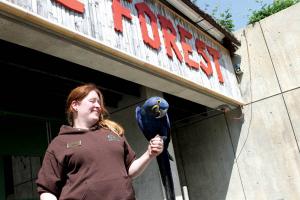July 14, 2011
 Franklin Park zookeeper Kerri Vitale, originally from Dorchester, greeted zoo visitors along with Azul, a hyacinth macaw, on Tuesday. Photo by Michael Caprio
Franklin Park zookeeper Kerri Vitale, originally from Dorchester, greeted zoo visitors along with Azul, a hyacinth macaw, on Tuesday. Photo by Michael Caprio
Moviegoers nationwide were introduced to a piece of Dorchester last Friday with the release of the summer comedy “Zookeeper,” which was filmed in Franklin Park Zoo.
The film follows Griffin Keyes (Kevin James), a Franklin Park Zoo keeper with a strong affection for his animals. After Keyes decides to leave his job to chase the girl of his dreams, his animals break their “code of silence” and speak to Keyes, convincing him to stay.
The film features celebrity voice-overs from the likes of Cher, Nick Nolte, and Sylvester Stallone. Dorchester’s own Donnie Wahlberg also makes an appearance, as Keyes’s malevolent coworker, Shane.
But, talking animals aside, how accurately does the film depict Franklin Park keepers?
Pretty well, actually, says John Linehan, president and CEO of Zoo New England, which manages the Franklin Park Zoo and the Stone Zoo in Stoneham.
Linehan, who advised the directing crew on zookeeping during the filming, maintains that James’s portrayal of a zookeeper, while comical, is on mark. “In the film, Kevin James has a connection to his animals to the point where he seems to feel more comfortable with his animals than he does with his humans,” Linehan says. “That’s true of many of our zookeepers. You find that they like working with animals more. Some animals might be dangerous, but they’re all very honest.”
But there are other duties that come with being a zookeeper besides feeding – and talking – to animals. In taming the wild, the zookeeper has to face day-to-day dilemmas over how to draw blood from a lion, or how to give a gorilla an ultrasound test.
A zookeeper’s job – for which there is no formal education requirements – is highly demanding, Linehan says. Unfortunately, many zookeeper applicants who think they are “good with animals” lack the discipline needed to do the grunt work associated with the job.
“There’s a lot of hauling, lifting, carrying – things like that,” says Linehan.
The application process is also rigorous, even with the lack of formal training requirements. All zookeepers have bachelor’s degrees, many in areas like biology. “We look at people’s character and level of maturity,” Linehan says. “People might say that they’re good with animals, but that could also be a sign that they are overly confident, not giving the animals the respect they deserve.”
As challenging as it is, Linehan is the first to say that the profession can be a reliably rewarding one: “It’s an art and a science. Some biologists like to take time and classify things and put things in text books, but we find on the job that sometimes the animals don’t follow the rules. These animals will teach you things throughout your whole life.”


